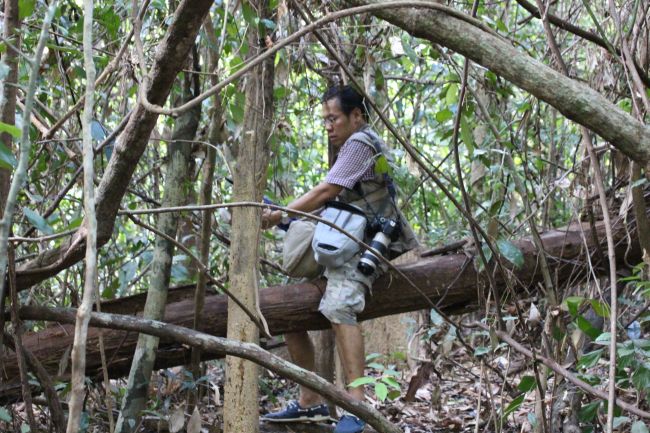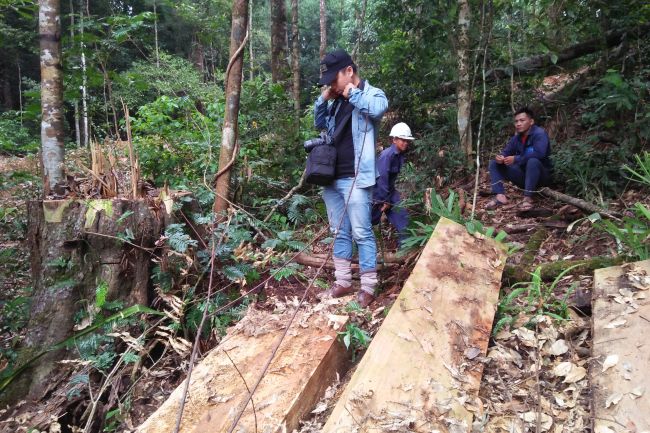Reporters break news that stops illegal logging
“The large wooden trunks were strewn with lush, rotten sap and crushed green leaves right before our eyes,” wrote Do Doan Hoang, a journalist from Lao Dong newspaper. “Along the road, there were sawn timber trees with a diameter of up to one meter, tens of meters long, just felled by loggers.”
Hoang published evidence of illegal logging and information about the causes of deforestation in Viet Nam based on his experience in training on field investigations organized by People and Nature Reconciliation (PanNature), a Vietnamese non-profit and partner in the Voices for Mekong Forests (V4MF) project.
V4MF is a five-year project funded by the European Union. It aims to strengthen the power of non-state actors such as civil society, Indigenous Peoples, private sector and local community groups to engage in and influence forest governance in Cambodia, Lao PDR, Myanmar, Thailand and Viet Nam. The project supports the EU’s Forest Law Enforcement Governance and Trade (FLEGT) initiative and the United Nations’ Reducing Emissions from Deforestation and forest Degradation (REDD+) initiative.
In Viet Nam, PanNature is building the capacity of journalists to investigate the health of forests and assess weaknesses in forestry policies and enforcement to inform the public and authorities. In Viet Nam there are few opportunities for Vietnamese journalists to improve their knowledge about forest governance and their investigative reporting skills through on-job training.
PanNature organized four field trainings on forest governance for about 20 journalists between 2018 and 2019. After the trainings, the journalists produced almost 40 stories on forest governance issues that inspired local government action.
“Many cases of deforestation were uncovered, helping to shed light on the flaws and limitations of forest management and protection in Viet Nam,” said Hoang, who published an article on deforestation in Kon Tum province. “The training helped me choose the topics that have social significance and can positively contribute to the well-being of communities.”
Vo Manh Hung, a journalist with Vietnam News Agency, goes by his pen name Hung Vo. After the training, he collaborated with PanNature to develop a special 10-part series of articles, videos and photos demonstrating the current situation of forest governance in Viet Nam.
“Through the field trip, I have a better understanding of the current status of Viet Nam's forests, the causes of deforestation, the weaknesses of law enforcement at the local level and the national policies,” said Hung Vo.
In response to these and other stories, local authorities stopped some illegal forestry operations, arrested forest rangers and tightened forest protection in illegal logging hot spots.
In honour of Hung Vo’s journalistic impact, he was awarded three national and professional prizes for his reporting on the environment and climate change. He shared his experience on Vietnam Television Corporation and with the Vietnam Journalists’ Association.
The training is just one example of PanNature’s success in engaging journalists in forest governance. In addition to field training, PanNature connects journalists in a series of seminars to forestry experts to deepen their knowledge on forest governance in Viet Nam.
In the past two years, PanNature has organized three seminars where journalists learned about restoring natural forests, community forestry and the need to diversify how special-use forests are financed. Special-use forests are forests used for nature conservation, scientific research, and preservation of ecosystem services, and cultural customs.
PanNature’s seminars engaged 73 national journalists from media agencies and local journalists from Quang Nam and Kon Tum provinces. The journalists published almost 50 articles after these seminars.
With V4MF support, PanNature will continue to engage journalists in additional seminars and investigations related to FLEGT, REDD+, payments for forest environmental services and Viet Nam’s Law on Biodiversity.
###
Nguyen Thi Thuy Hang is a communication manager at PanNature.
This story is produced with the financial support of the European Union. Its content is the sole responsibility of RECOFTC and PanNature and it does not necessarily reflect the views of the European Union. To find out more about this and other activities under the EU-funded Voices for Mekong Forests, visit the project page.




